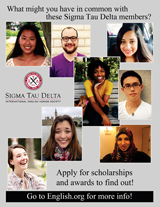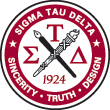Frequently Asked Questions (FAQs)
Topics
1. Eligibility
2. Application Essays
3. Sample Papers
4. Re-using Materials
5. Disqualification
6. The Judging Process
7. Runners-up
8. Regent Scholarships
9. Notifications
10. What materials am I required to submit with my application?
Eligibility
Q. I've transferred to a university that does not have an active Sigma Tau Delta chapter. Am I eligible to apply for a scholarship, internship, or award?
A. For most of the scholarships and awards, you must be a student member of an active chapter to apply. These applications ask for your Chapter Advisor's information, so you could NOT apply for these scholarships/awards until you have established a chapter at that institution and become a student member again. However, you may be eligible for the Continuing Education Scholarship or the Graduate Scholarship. You may apply for the Scholarly Paper Award if you were a student member at the time you read the paper.
Q. I want to apply for a scholarship or academic award, but I will be transferring to a different university next year. May I still apply?
A. Yes, you should still apply. For most of the scholarships/awards/internships, we will need proof that you are enrolled as a full-time student in an English degree program or as a full-time student with coursework in one or more fields that foster the discipline of English the fall semester following the announcement that you've won. Then we'll send you the money. It does not matter if you're attending a different institution, and it does not matter if they have or do not have an active chapter (though we'd love to have you get one organized if they don't!). The exception would be the Scholarly Paper Award, which does not mandate your being enrolled in school the next fall.
Q. I am a senior who will not graduate this spring, but will be a fifth-year senior next year. May I still apply for a Senior Scholarship?
A. Yes, you should apply for a Senior Scholarship during your senior year. You must be enrolled as a full-time student in a field that fosters the discipline of English the fall semester following the announcement that you've won. It doesn't matter if you're in graduate school then or finishing your senior coursework.
Q. I might qualify for both a William C. Johnson Distinguished Scholarship and another scholarship. Must I apply for only one?
A. No. You should apply for all scholarships for which you might qualify. Where possible, use the same information for both, including recommendation letters and application essays. For example, the application for the William C. Johnson Distinguished Scholarship and the Senior Scholarship are virtually the same, with the exception of the sample paper requirement for the Johnson Scholarship.
Application Essays
Q. What do I write about in my short application essay?
A. In the past, we have given applicants the opportunity to write broadly based on the theme of the current convention. This year the Committee elected to create a more directive prompt for this essay. While you still have considerable latitude for personalizing your essay, you should also plan to answer this specific question.
Q. What do the judges expect?
A. Currently, there are no set criteria for judging the application essays, though judges do work with a rubric for the application as a whole and have high standards regarding language usage and creativity. Judges expect well-written essays that answer the question in a focused and personalized way.
Q. In the Somerville Award application, I'm required to write a brief professional statement. What are the judges looking for?
A. Again, judges have high standards for rating your writing. Proofread carefully. Judges have commented in the past that only the best students in English should be representing us in the field of education. Judges may also appreciate the grounding of abstract theory in specific methods, especially those that may be particular to the demands of teaching English. For example, you may theorize that all students can learn to write complete sentences, but judges probably would also be interested in why you believe this is important and how you might apply your theory in a classroom.
Q. The Study Abroad and Summer Program scholarship application require a 200-400 word "statement" explaining the nature and relevance of the program. Is this really another "essay" in addition to the "application essay?"
A. You could say that. Judges need to discriminate between study abroad and summer programs and determine how well the programs meet your goals and the purposes of Sigma Tau Delta. However, if we used the word "essay" to identify this item, it could be confused with the "application essay" on the annual convention theme.
Sample Papers
Q. What kind of sample paper should I submit?
A. Your sample paper, required for the William C. Johnson Distinguished Scholarship and some of the internships, should be a paper you think is exceptional, usually one written for an English-related course. You will be required to provide contact information for your course instructor (for whom the paper was written) so that we are able to verify that you submitted the paper for that course.
Q. Must the paper have been written during the semester when I'm applying?
A. It need not be. You may re-work any appropriate (or English-related) paper written for any course, as long as you have verification from the instructor for whom the paper was first written.
Q. What if I'm writing a paper for a course during the semester in which I intend to apply for the Johnson Scholarship? May I use that paper, even though the due date for the course paper comes after the date when I will need to submit my application?
A. Sigma Tau Delta will need to contact your professor to verify that your paper is your own original work. However, the actual grade you receive on the paper and/or what the instructor thought about its merits are immaterial to our scholarship process. Thus you could, indeed, submit a paper that had not yet been graded by the instructor but that had been turned in (early, perhaps).
Re-using Materials
Q. When I apply for a scholarship two years in a row, may I re-use portions of the previous year's application?
A. There is nothing currently in the committee's policies that stipulates you must use new materials in every application. Many students apply for both the William C. Johnson Distinguished Scholarship and a Graduate/Senior/Junior Scholarship and use (as appropriate) the same materials for both. There is also no current rule that prohibits using the same application materials for two consecutive years, as long as the student continues to be eligible. However, you would need to re-submit an application each year (or, in the case of Study Abroad scholarships, each semester).
Q. I am applying for two scholarships. May I use the same recommendations for both?
A. Yes. After you submit your electronic application, your recommenders will receive an email message prompting them to follow up to submit their letter of recommendation electronically. Each of your recommenders only needs to provide a single electronic copy of his or her recommendation.
Disqualification
Q. What might cause my application to be disqualified?
A. You might be disqualified for not following directions:
- Submitting a plagiarized essay or paper
- Using an incorrect format
- Leaving out parts of the application
- Misrepresenting coursework
- Misrepresenting the GPA(s) for that coursework
- Submitting an essay that exceeds the maximum length requirement
- Submitting the wrong application for your status (juniors should apply for the Junior Scholarship in their junior year, seniors apply for the Senior Scholarship in their senior year, and graduate students apply for the Graduate Scholarship while in graduate school)
- Submitting a paper (for the Scholarly Paper Award) that was presented at a Sigma Tau Delta—rather than a professional (English-related) non-Sigma Tau Delta—conference
The Judging Process
Q. Who judges the applications?
A. Judges are Sigma Tau Delta Faculty Advisors representing various regions.
Q. Do Board members judge applications?
A. A Board member chairs the Scholarships and Academic Awards Committee, but does not routinely take part in the actual judging of applications. Another Board member and a Student Representative typically sit on the committee. While some Board members serve as judges, other judges are typically Chapter Advisors.
Q. Do judges serve for more than one year?
A. Yes, some judges serve for several years, but every year the committee has a number of judges new to the process, too.
Q. How do judges weight the different components of my application?
A. Judges use rubrics to evaluate scholarship applications. The weighting or prioritizing of the judging process varies from scholarship to scholarship; for example, the William C. Johnson Distinguished Scholarship considers service to Sigma Tau Delta as a more important component than for some other scholarships. When a large number of applications are of an extremely high caliber academically, service may be the distinguishing feature of an application.
Runners-up
Q. What happens if I receive a Runner-up Award?
A. Runners-up are next in line for the scholarship or award for which they applied. Should a winner be unable to accept a scholarship/internship/ award, the first runner-up in that competition would be offered the award (some categories do not have runners-up). Runners-up who move into the winner category relinquish their runner-up awards.
Regent Scholarships
Q. What is a Regent Scholarship?
A. Depending upon funding and application numbers, after all other scholarships are awarded, the highest scoring remaining application from each region is awarded a Regent Scholarship.
Notifications
Q. When will I know if I've won or not?
A. Award Dates for each awards cycle are identified on the Awards Overview page of the website.
Q. Can I win in more than one category?
A. You may not hold two concurrent scholarships; however, you could also win, for example, the Scholarly Paper Award or a website award, etc.
Printable Downloads [PDF]
Scholarship Flyer (pictured above)
Resources
About Scholarships
Writing Effective Letters of Recommendation


